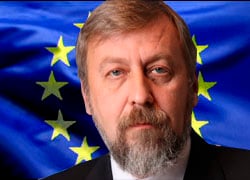Andrei Sannikov: “Policy of unilateral advances to dictator brings no results”
19- 26.10.2009, 13:27

The leader of the civil campaign “European Belarus” had a meeting with the presidents of the Baltic states in Riga.
The Riga Conference 2009 “Economic Recovery in a Changing Security Environment: Transatlantic Agenda 2010” gathered the leading European and American experts, researchers, journalists, politicians, public figures on October 23–25, the website “European Belarus” reports.
The conference focused on issues relating to the economic crisis and the ways to tackle it. The global crisis wasn’t the only issue discussed. The participants also spoke about NATO strategic concept to be adopted next year, new challenges caused by the last year Russian–Georgian war, energy security, transatlantic cooperation.
Traditionally, the Riga conference was held on high level. The president of the three Baltic states – Toomas Hendrik Ilves, Valdis Zatlers, and Dalia Grybauskaite – took part in its concluding session.
Andrei Sannikov and Mikhail Marynich represented the civil campaign “European Belarus” at the conference.
– We had talks with a number of politicians, experts, analysts at the conference. We discussed the situation in Belarus. In particular, we had conversations with presidents of Latvia and Estonia Valdis Zatlers and Toomas Hendrik Ilves, Lithuanian Foreign Minister Vygaudas Usackas, Latvian Foreign Minister Maris Riekstins, Deputy Prime Minister, Foreign Minister of Luxemburg Jean Asselborn, representatives of the European Commission, members of the European Parliament and national parliaments,” Andrei Sannikov told in an interview to the website “European Belarus”. “In my view, they understand Europe has made serious steps in a dialogue with Lukashenka, but the Belarusian regime hasn’t made anything to fulfil its promises. We talked about ongoing suppression of human rights and freedoms, political prisoners, outrageous dispersals of peaceful rallies. We spoke about a new campaign against journalists, launched by the authorities to hinder them to record beating of demonstrators,” the politician said.
– As far as is known, the European Union is to make a decision in November on whether it will extend or suspend visa bans on Belarusian officials. Was this question raised during your meetings?
– Yes, it was very important to discuss the situation in Belarus with politicians and analysts and inform them about absence of visible changes in human rights sector. The European Union should probably think about sober estimation of its efforts and think about other instruments to influence the Belarusian regime, because the policy of unilateral advances brings no results.
– What else did you discuss with your European colleagues?
– We discussed the issue of non-recognition of South Ossetia and Abkhazia with Secretary of the National Security Council Eka Tkeshelashvili. Some European politicians regard this issue as nearly the only criteria for continuing the dialogue with Lukashenka, relegating the EU principal approaches and standards of respect for human rights and democracy to the background. We cannot but worry about this, because we saw Lukashenka using this situation to bargain both with Europe and Russia. Ms Tkeshelashvili emphasized the issue of non-recognition of S. Ossetia and Abkhazia was of great importance for them, but by no means should it serve as a cover for undemocratic regimes. Georgia is extremely interested in development of democracy in the region. In particularly, in Belarus. Only in this case it can count on support of its democracy.
Traditionally, the Riga Conference is absolutely open for participants of the highest level, lively and hot discussions. During the last, “presidential” discussion, coordinator of “European Belarus” Andrei Sannikov asked president of Lithuania Dalia Grybauskaite:
– I asked her: “Ms President, I think you should know you insulted many Belarusians having met with Lukashenka in Vilnius on September 16. This happened on the day when the largest military exercise, which aim was the Baltic states, in Europe since the Soviet times started in Belarus. On that day ten years ago, opposition figures Anatol Krasouski and Viktar Hanchar disappeared. I know how painful it was for their families to hear about this meeting. On that day, the Day of Belarusian Solidarity, participants of a peaceful demonstration, who gathered to pay tribute to the memory of the disappeared politicians, victims of repressions, and political prisoners, were beaten up in Minsk. We hear about positive signals allegedly coming from Belarus. We can agree to a certain degree that there were some positive changes last year, when political prisoners were freed, but it was done due to a tough stance of the United States on this issue. No positive signs can be noticed today. We have political prisoners, opposition is till persecuted, peaceful demonstrations are dispersed, demonstrators are beaten. Moreover, the Belarus regime has chosen journalists as its target, hindering them to perform their professional duties in order you not to see photos and hear reports about the real events in Belarus. The current situation doesn’t comply with the high level of recognition of dictator Lukashenka that your meeting secured. Do you think it is possible to change Lukashenka or gain transformations in Belarus through him, laying aside the matter of principles, on which the European Union is based on?”
In response, the Lithuanian president repeated the already known arguments we hear often from some European politicians that ten years of isolation haven’t bring any results and the EU policy should be changed. The people of Belarus should be given the second chance. Europe and I can’t be “sainter than the Pope”, who accepted Lukashenka. Why should I not to have met with him?”
In general, it should be noted that the Riga Conference has become one of the biggest world forums, where the most important political issues are discussed. Participation of representatives of the Belarusian opposition in such conference is very important, because it gives an opportunity to discuss the situation in the country and also in the region and the whole world. It means that such discussions can influence the international context, in which new Belarus will live, Andrei Sannikov said.










